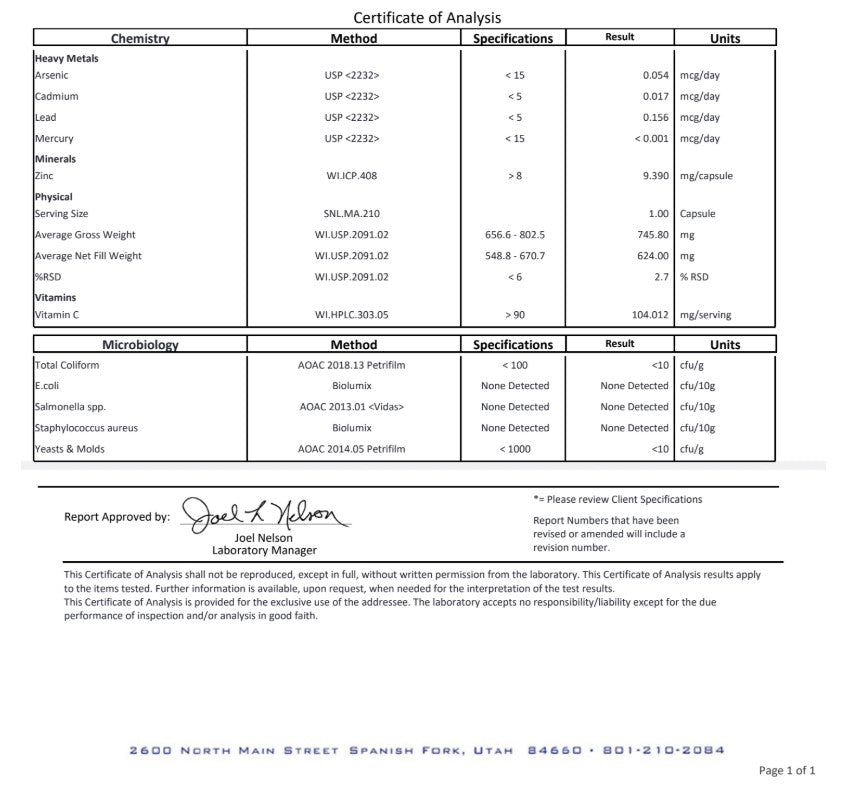Vitamin C
May support immune, cardiovascular, skin, cognitive, fat burning, and digestive health (97, 98).
May support immune health via increased oxidant, free radical scavenging, and fueling neutrophilic (immune cell) activity in chemotaxis, phagocytosis, and microbial killing (97,98).
May support fat burning by increasing carnitine biosynthesis (molecule required for mitochondrial fatty acid oxidation) (97,98).
May support accelerated bone healing after a fracture, increased type I collagen synthesis, and reduced oxidative stress (inflammation) (98).
Vitamin E
May support immune function, cognitive health, cardiovascular health, and bone health (204,205,206,207,208)
May support immune health via neutralizing free radicals and reactive oxygen species, and increased T lymphocyte-mediated immune function (204).
May support cardiovascular health via reduced cholesterol (204).
May support cognitive function via reduced oxidative stress, inflammation, and DNA damage of neuronal tissues (208).
Zinc
May support immune function, skin health, cognitive function, and vision (172,173).
May support stimulation of the innate and adaptive immune system (172,173).
May support the activation of lymphocytes and activation of innate T cell-mediated immunity (172,173).
May support cognitive function by modulation of neuronal signaling in areas of the brain associated with memory and learning (hippocampus) (172,173).
L-Glutamine
The most abundant amino acid in skeletal muscle that fuels immune cells, may support improved exercise recovery, and optimized gut microbiome (18).
Vital for lymphocyte (immune cell) proliferation (growth) and paramount in neutrophil (immune cell) destruction of bacteria (18).
Vital for activation of genetic signals that support immune function and vitality (18).
Glutamine is utilized by immune cells at high rates during catabolic conditions (post-surgery, sepsis, burns, and extreme exercise (18).
Elderberry Extract
May support antioxidant function, cardiovascular health, and may aid as antiviral agent (231,232,233,234).
May support antioxidant function due to polyphenolic content, increased free radical scavenging ability, and reduced inflammatory cytokines (231,232,233)
May support antiviral activity against pathogens via flavonoids that bind to and reduce H1N1-type IV infection (234).
May support antimicrobial effects via reducing bacteria that cause upper respiratory tract infections (Gram-positive bacteria Streptococcus pyogenes and group C and G Streptococci) (234).
Echinacea
May support increased antiviral, anti-microbial, antioxidant capacity, and increased immune system (159,160).
May support immune health via decreased proinflammatory markers (cytokines IL-6, IL-8, and TNF) (159,160).
May support adaptive and innate immunity via increased monocytes, neutrophils, natural killer cells, and CD8 T cells (159,160).
Garlic
May support cardiovascular health, immune health, joint health, reduced inflammation, gut health, and enhanced antibacterial activity (161).
May support cardiovascular health via reduced hypertension, reduced total cholesterol, reduced arterial stiffness (hardening of arteries), and markers of atherosclerosis (161).
May support joint health via reduced NF-κB activation (inflammation) in human fibroblast cells and reduced prevalence of pain in individuals with rheumatoid arthritis (162).
May support gut health via increased prebiotic properties, increased microbiome population, and increased Lactobacillus and Clostridia species (163).
May support immune health via a reduction in inflammatory markers (CRP, TNF, IL-6) (164).
Turmeric 95% curcuminoids
May support antioxidant, cardio-protective, anti-inflammatory, anti-microbial, nephro-protective, hepato-protective, immunomodulatory, and anti-rheumatic effects (123).
May support reduced inflammation via decreases of inflammatory markers such as c-reactive protein, interleukin 6, tumor necrosis factor, and decreased cytokine production (123).
May support joint health via decreases in connective tissue inflammation and improved pain in individuals with osteoarthritis (122).
May support blood sugar regulation via increased pancreatic beta cell function and improved insulin sensitivity (121).
Lactobacillus Acidophilus
May support athletic performance, enhanced gut microbiome, increased muscle mass, immune health, reduced cortisol levels, digestive health, cognitive function, and improved allergy symptoms (103,104, 107, 108, 109).
Supports 70% of gut-immunological axis (gut immune system) via enhanced mucosal immune response (toll-like receptors), and upregulation of genetic markers associated with macrophage (gut-immune cell) activity (108, 109).
May support digestive and immune health via decreased irritable bowel symptoms, suppression of helicobacter pylori growth (pathogenic bacteria), reduced histamine (reduced allergic response), and reduced gut inflammation (103,104, 107, 108, 109).
May support athletic performance via reduction of respiratory tract infections, reduced muscle damage, improved body composition, reduction lactate induced exercise (muscle burn), and body composition (108).
May support gut-brain axis via increased neural, endocrine (hormonal), and anti-inflammatory modulation of the hypothalamic-pituitary-adrenal (HPA) axis (108).
May support reduced inflammation via activation of Toll-like receptors (TLRs) and downregulates the expression of nuclear factor (NF)-κB and pro-inflammatory cytokines (inflammation markers) (109).













